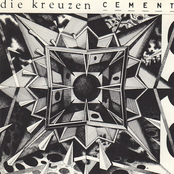Cement

Biography
Die Kreuzen (prouounced Dee-Kroytzen) formed in mid-1981 by vocalist Dan Kubinski and guitarist Brian Egeness aka "Herman," from Rockford, IL, and two from Brookfield, WI, bassist Keith Brammer and drummer Erik Tunison. They became acquainted through the varied Milwaukee 'new music' scene and realized a common interest, not only music but also in escaping the boring reality of nine-to-five life. They set about practicing and playing wherever and whenever they could, and seizing every opportuni...
Die Kreuzen (prouounced Dee-Kroytzen) formed in mid-1981 by vocalist Dan Kubinski and guitarist Brian Egeness aka "Herman," from Rockford, IL, and two from Brookfield, WI, bassist Keith Brammer and drummer Erik Tunison. They became acquainted through the varied Milwaukee 'new music' scene and realized a common interest, not only music but also in escaping the boring reality of nine-to-five life.
They set about practicing and playing wherever and whenever they could, and seizing every opportunity to broaden their horizons by playing out of town (i.e. Minneapolis, Chicago, Madison, Indianapolis). Their name was chosen specifically to avoid stereotyping, because "no one knows what it means". -- Keith Brammer "The band's name is broken German for "the crosses" and was from a German Bible." -- Brian Egeness
Their first recorded output was two songs on Noise magazine's Charred Remains cassette compilation, followed by three on The Master Tape compilation LP. This and the ensuing press in Milwaukee and especially elsewhere led to the release in late 1982 of a 7" on the Version Sound label, entitled Cows & Beer, the title being "an in-joke on peoples' preconceptions of life in Wisconsin". This proceeded to sell out two pressings of 1,000 apiece, and is incidentally a much sought-after collector's item, prompting them to undertake their first tour of the South and West Coast in the summer of 1983.
Upon returning, they were greeted with the news that Touch and Go Records wanted to release an album, which for various reasons did not appear until July 1984. This 21-song self-titled LP then proceeded to sell upwards of 13,000 copies in the U.S. and Europe, and is still selling today. The release was followed by two years of repeatedly touring the States and Canada and gradually, through word of mouth and press of all sorts, spreading their name everywhere.
Gradually their songs were changing, their sound evolving and maturing. This was exhibited on their second LP for Touch and Go Records, October File, released in May 1986. Two more years of slow but steady songwriting and touring, helped along by positive critical response resulted in the release, in July 1988, of their third Touch and Go Records album, Century Days.
Progress, variety and melody are the key words here, adventurous songwriting accented by diverse production and outside help from horns without losing the band's trademark drive and excitement. Attractive packaging, multiple formats (11 song LP, 12 song cassette, 13 song CD), international distribution and increased airplay helped Century Days do very well.
After more extensive touring and various side projects, the band flirted with some new record labels but eventually released their fourth LP for Touch and Go Records in 1991, Cement. Of course, the band resumed touring in support of their new album.
On April 1, 1992, Die Kreuzen disbanded amid much conflict when guitarist Brian Egeness decided to pursue other interests. "He had different things to do, a different agenda." Keith Brammer said.
Official Websites
Official MySpace Page
Official Page at Touch and Go Records
"Counting Cracks" The Die Kreuzen Online Archive Site
Brian Egeness' Official website
Brian Egeness on IMDB
Decapitado Official Website
Read more on Last.fm. User-contributed text is available under the Creative Commons By-SA License; additional terms may apply.
